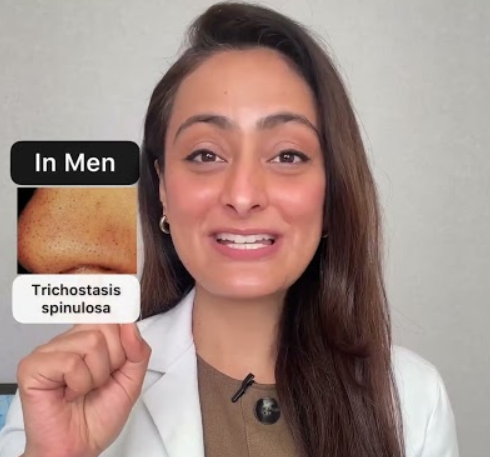Blackheads are a common skin concern, often regarded as a mild form of acne. These small, dark spots appear primarily on the face, particularly the nose and forehead, but can also develop on the back, chest, and shoulders. Understanding the causes and effective treatments for blackheads can help individuals manage this condition more effectively.
Causes of Blackheads
Blackheads form when hair follicles become clogged with excess oil, dead skin cells, and bacteria. This clogging process occurs due to several factors:
- Excess Oil Production: The sebaceous glands in the skin produce oil (sebum) to keep the skin hydrated. However, when the body produces too much oil, it can mix with dead skin cells and block the pores.
- Hormonal Changes: Hormonal fluctuations, particularly during puberty, menstruation, or pregnancy, can lead to increased oil production. Androgens, the male hormones present in both genders, are known to stimulate the sebaceous glands.
- Improper Exfoliation: Regular exfoliation helps remove dead skin cells from the surface of the skin. If this process is neglected, these cells can accumulate, leading to clogged pores.
- Use of Comedogenic Products: Some skincare and makeup products contain ingredients that can clog pores. These comedogenic products are best avoided by individuals prone to blackheads.
- Diet and Lifestyle: Although research is ongoing, some studies suggest that diets high in sugar and dairy may contribute to acne. Stress and inadequate sleep can also exacerbate skin issues.
Treatment Options
Treating blackheads effectively often involves a combination of proper skincare practices and targeted treatments. Here are some common approaches:
- Cleansing: A gentle, non-comedogenic cleanser used twice daily can help remove excess oil and prevent new blackheads from forming. Look for products containing salicylic acid, which can penetrate pores and help dissolve the debris inside.
- Exfoliation: Regular exfoliation is crucial in preventing blackheads. Chemical exfoliants, such as alpha hydroxy acids (AHAs) and beta hydroxy acids (BHAs), can effectively slough off dead skin cells without the harshness of physical scrubs. These acids help to unclog pores and promote skin cell turnover.
- Topical Treatments: Over-the-counter products containing benzoyl peroxide or retinoids can be beneficial. Benzoyl peroxide kills bacteria and reduces oil production, while retinoids promote cell turnover and prevent clogged pores.
- Professional Treatments: For persistent blackheads, professional treatments such as chemical peels, microdermabrasion, or extraction procedures performed by dermatologists can provide significant relief. These treatments are more intensive and can help clear the skin more effectively than at-home options.
- Lifestyle Changes: Incorporating a balanced diet, staying hydrated, managing stress, and getting adequate sleep can positively impact skin health. Regular exercise can also improve circulation and overall skin appearance.
Prevention
To minimize the risk of developing blackheads, it’s essential to maintain a consistent skincare routine. Always remove makeup before bed, avoid touching your face, and be cautious with the products you use. Additionally, regular visits to a dermatologist can help tailor a skincare regimen suited to individual needs.
Conclusion
Blackheads are a common but manageable skin issue. By understanding their causes and exploring various treatment options, individuals can effectively tackle blackheads and promote healthier skin. With patience and proper care, achieving clearer skin is entirely possible.
